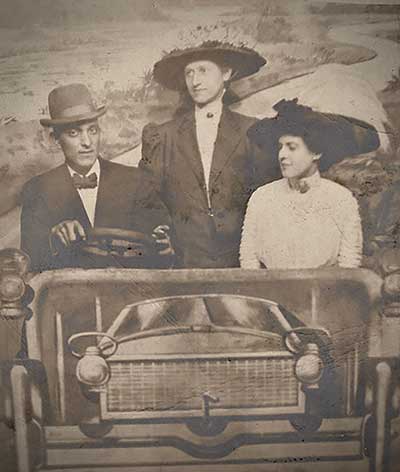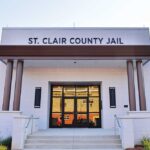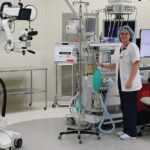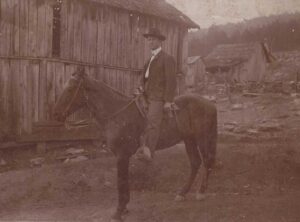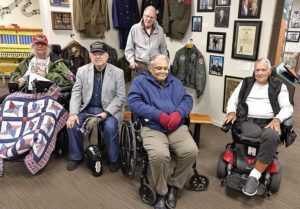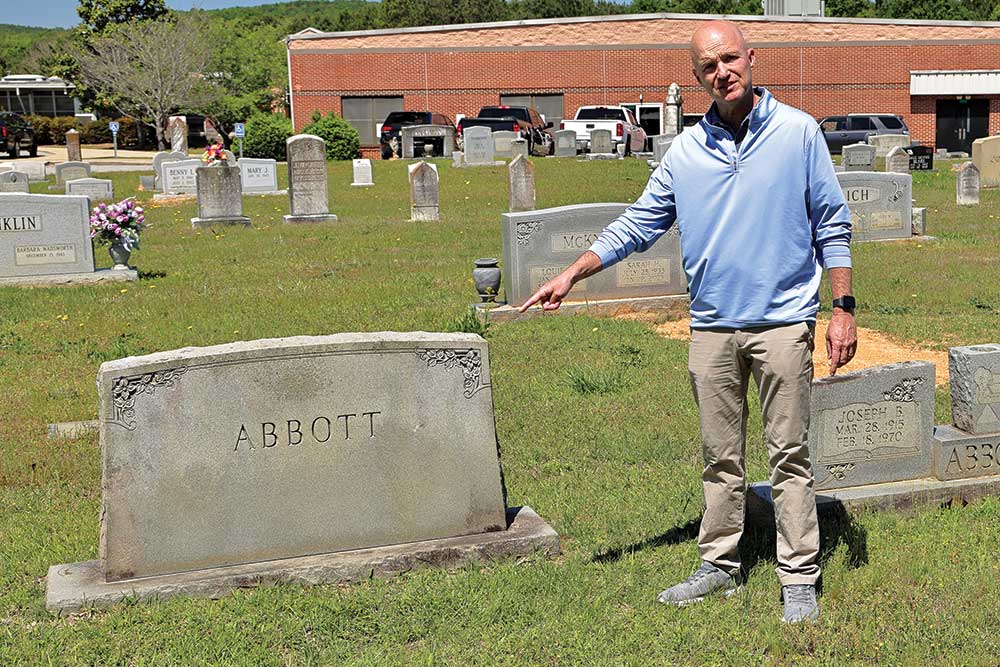
Searching for treasures in our past
Story by Roxann Edsall
Photos by Richard Rybka
Submitted photos
“It’s like finding a box of buried jewels,” says Tom Mottlau, describing the hunt that has become his happy obsession. He’s spent countless hours over the past three years researching his genealogy. For him, each discovery is a treasured connection to his family tree.
For Mottlau, it all started when he found himself cooped up at home during the 2020 COVID-19 pandemic lockdown. An executive with LG Electronics, Mottlau typically spent most of his time flying internationally, but suddenly found himself grounded at home with loads of time on his hands.
He had always been interested in history, particularly his own family history. With time to work on it, he subscribed to the online ancestry database, ancestry.com, and began populating his family tree with things he already knew about his genealogy.
Further research landed him in St. Clair County. Using information found on billiongraves.com and findagrave.com, he found that he had family buried at Coosa Valley Baptist Church in Cropwell. So, he headed to the cemetery, where he found the graves of two sets of great-great-great-grandparents, John James and Purlina Abbott and Samuel Patton and Margaret McClellan. Along with many others originally laid to rest at Easonville Methodist Church, their caskets were moved to the Cropwell land before the flooding of Easonville when Alabama Power impounded the Coosa River in 1964 to create Logan Martin Lake.
He’s also located many of his ancestors’ graves at Elmwood Cemetery in Birmingham and has made it his mission to replace those grave markers that were broken or missing.
Locating information about ancestors can be a daunting process because America is truly a melting pot of nationalities. Going back several generations, many Americans find that, like Mottlau’s family, their ancestors immigrated from many different countries.
For him, those people came from Denmark, Ireland, Costa Rica, Portugal and Jamaica. He has discovered that some of his distant relatives worked to help build the Panama Canal. Others worked in the steel industry, which is what eventually led them to Birmingham.
Mottlau grew up in Miami, Florida, but now resides in Sugar Hill, Georgia. He has a son in school at Ole Miss, and the drive to visit him takes him over Logan Martin Lake. Each time he crosses over the water, he wonders about his ancestors who called this place their home.
On several such trips, he’s made a slight detour to Ashville, where he spent time at the St. Clair County Archives, digging deeper into information he’s found on ancestry websites. Originally an extension of the library in Ashville, the archives were moved to the current location in the former Ashville Savings Bank in 2007 and offer numerous resources for people researching their ancestry.
Archive director Robert Debter says the first step he always recommends in tracking down information on family histories is to check the heritage book for your county. “Every county has one,” he explains as he grabs a book off the shelf. “All the families that have connections to St. Clair County since it was established in 1818 are included in the St. Clair book.” These books include records on adoptions, wills, estates, as well as probate, civil and circuit court records.
After that, Debter recommends looking online in one of several ancestry databases, websites like ancestry.com, newspapers.com, or, for military records, fold3.com.
History buff and Ashville resident Billy Price has used these databases extensively to find out more about his own family. He spends at least one day a week at the archives and has learned that his family included two Revolutionary War veterans, two dozen Confederate soldiers and two Union solders.
Use of these databases on a personal computer requires a membership fee, but the St. Clair County archives and the Pell City library offer ancestry searches under their memberships for free. Patrons can get on one of the library computers and search their family histories on newspapers.com, which has information from American newspapers from as far back as the 1600s. Another available resource is familysearch.org.
“When I started fine-tuning my own family genealogy,” says Pell City Library Director Danny Stewart, “I started by asking my oldest family members to verify the stories that had been passed down. I would also search obituaries, deed records, titles and tax records.”
Mottlau has done all that. He can’t put a number on how many hours he’s spent on the computer running down leads. “My wife says I should have been a detective,” he says. “I’ve uncovered a lot, but just keep going deeper. I really want to find out enough to create an archive and make copies for all my other cousins.”
Mottlau also wants to find pictures of everyone in his direct line up to his great-great-great-grandparents. Addressing that goal, Stewart recommends regular searches on newspapers.com. As a frequent visitor to that website himself, he has recently discovered a picture of his mother’s great-uncle from 1906 that had just been digitized and uploaded to the website.
Sometimes, though, the actual story behind the picture is not the one passed down from generation to generation. Mottlau tells the story his grandmother told him about a picture of her dad. The story was that he was an attorney and was shot on the courthouse steps in Birmingham. After extensive research, Mottlau learned that his great grandfather was, indeed, shot in 1912, but not on the courthouse steps. He died in a pistol duel across the street from the courthouse, on the steps of the Stag Saloon. That information has been one of the biggest surprises to date on Mottlau’s ancestry quest.
On a recent trip to Pell City, Mottlau again stopped by the familiar grave sites at the Coosa Valley Baptist Church cemetery. He questions whether the burial plot of John James and Purlina Abbott might also include the remains of their son and daughter-in-law, John Henry and Idora Abbott, beneath a marker that simply reads “Abbott.” There are no records that he has been able to find that list the events or location of their burial site. It’s just another mystery that he continues to work to unravel.
After more than three years of searching, Mottlau has made progress, confirming some things he knew about his family and dispelling some as fiction. It’s a painstaking process, but he says finding out more about the family who are part of his past has been a labor of love. “I just really want to know the people they were,” he says.
Every now and then he finds another jewel. Some are rough and take some polishing. In the end, they are all part of his treasured past. And they’ll become part of the legacy that he will, one day, pass down to his own children.














